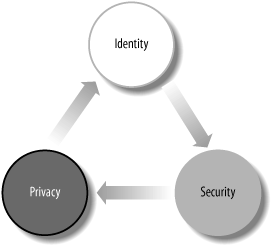Identity, Security, and Privacy
Digital identity is often thought of as a subtopic of computer or information security. Certainly, digital identity is an important part of security, but digital identity has greater utility than just protecting information. We've already discussed how digital identity enables important business relationships. At the same time, information security is about more than simply performing authorization and authentication. Firewalls, for example, provide security but is not necessarily about identity.
Still, the goal of information security is to protect information from unauthorized access, destruction, or alteration. Privacy is the protection of the attributes, preferences, and traits associated with an identity from being disseminated beyond the subject's needs in any particular transaction. In a circular manner, privacy is built upon a foundation of good information security, which is, in turn, dependent on a good digital identity infrastructure. This relationship is shown in Figure 2-2.

Figure 2-2. The identity, security, privacy triangle
We will discuss privacy in some detail in Chapter 4. Computer security, beyond the concepts that it has in common with identity, is beyond the scope of this book.
Get Digital Identity now with the O’Reilly learning platform.
O’Reilly members experience books, live events, courses curated by job role, and more from O’Reilly and nearly 200 top publishers.

